
We speak with NDN Collective founder and CEO Nick Tilsen, who was with Indigenous activist Leonard Peltier as he was released from a federal prison in Florida Monday after nearly half a century behind bars, and returned home with him to North Dakota. Peltier has always maintained his innocence for the 1975 killing of two FBI officers, and many activists have noted inconsistencies in his trial. In the final days of his presidency, former President Joe Biden granted Peltier clemency, commuting his life sentence. Peltier will remain on house arrest in the Turtle Mountain community in North Dakota. “Today I am finally free! They may have imprisoned me but they never took my spirit!” Peltier told supporters once he was released. “Thank you to all my supporters throughout the world who fought for my freedom.” Tilsen said it was “absolute pure joy” seeing him out of prison. “The release of Leonard Peltier is something that touches all of us, because all of us see a little bit of ourselves in Leonard Peltier.”
Transcript
AMY GOODMAN: This is Democracy Now!, democracynow.org, The War and Peace Report. And we turn now to an issue and a story we’ve been covering for all 29 years. We turn to Leonard Peltier. “Today I am finally free! They may have imprisoned me but they never took my spirit!” Those were the words of Leonard Peltier, the longtime political prisoner and Indigenous activist, who’s been released from prison after spending nearly half a century behind bars for a crime he says he did not commit.
On Tuesday morning, Leonard Peltier walked out of a federal prison in Florida a month after President Biden granted him clemency. The 80-year-old Peltier will now serve the remainder of his life sentence in home confinement. For decades, he’s maintained his innocence over the 1975 killing of two FBI agents in a shootout on the Pine Ridge Reservation in South Dakota. On Tuesday, Leonard Peltier briefly spoke after his release. You have to listen carefully. There are a lot of voices.
LEONARD PELTIER: We are not going to give up. We’re going to win. We’ve been winning. We’re going to continue to win. We’re going to — we’re going to stick together. We’re going to unite. As it is right now, we’ve been united all through Indigenous countries. And we’re going to — we’re going to fight back. We’re going to — we’re going to continue 'til we are a free nation. I gave 50 years for that. And I'm going to give the rest of my life. So, they haven’t broken — they have not broke me. I am not broken.
AMY GOODMAN: After Leonard Peltier was released from the Coleman prison in Florida, he flew back to North Dakota, where he’ll live on the tribal homelands of the Turtle Mountain Band of Chippewa Indians. Supporters greeted him as he landed in North Dakota.
SUPPORTERS: [ululating]
AMY GOODMAN: Supporters of Leonard Peltier also gathered in Florida Tuesday morning to greet him after his release. This is Tracker Ginamarie Rangel Quinones.
TRACKER GINAMARIE RANGEL QUINONES: So, our relative Leonard Peltier has been incarcerated for 50 years in a draconian system. And I am from Arizona. We are First Nation people. And we are here to witness this as our relative walks out. … This is the most important day, because not only does it stand for the Indigenous First Nation people here on Turtle Island, but it also stands for people internationally. This represents — his incarceration represented not only other political prisoners, but people who stand in solidarity for all humankind and humanity.
AMY GOODMAN: We go now to Belcourt, North Dakota, where we’re joined by Nick Tilsen, founder and CEO of NDN Collective, which helped lead the push to free Leonard Peltier. He accompanied Leonard home on Tuesday. Nick is a citizen of the Oglala Lakota Nation.
Nick, it’s great to have you back on with us. Can you describe the moment, as we look at that picture? For the first time, you have Leonard Peltier in a traditional Native ribbon shirt coming out of prison. Where were you? What did Leonard say? And describe the whole scene back home.
NICK TILSEN: Leonard Peltier walked out of the front doors of Coleman prison energetic and completely dignified. When he walked out, he shook the hands of all the corrections officers, and all of them were happy to see him go. They had deep respect for him. He came walking out, and I stuck my hand out to shake his hand, and he just hugged me, and he said, “I’m free. I’m finally, finally free.” And he was so excited to get out of the prison.
We hopped in the vehicle. We got him into the vehicle, and we started listening to Redbone and music, and he was dancing in the backseat of the car. And it was joy. It was absolute pure joy to watch him do that. And then we were able to do a ceremony for him and to wipe him off and to bless him and put prayers of protection over him and wipe him off from the things that happened there in prison.
And then, when we came home, when we got him back to Turtle Mountain, the streets were lined with hundreds and hundreds of people welcoming him home, holding up signs, cheering, singing, war whooping. It was a beautiful, beautiful sight. I remember seeing the sign that said, “Miigwech, Leonard Peltier,” which in the Anishinaabe language ”miigwech” means “thank you,” and the amount of love and gratitude in which he was embraced by his community, his people and his movement. It was an absolutely historic and moving day.
And Leonard was absolutely joyous when we rolled up to his home that we had got for him. And this is the first home Leonard Peltier had had since he was 9 years old, since he was taken away from Turtle Mountain to go off to boarding schools. And now he walked into this home that was prepared for him, and he loved it. And we prayed in that home, and we blessed out that home. And Leonard sat down on the couch and said, “Here, I’m finally home.”
And he thanked everybody. And that’s the thing he wants everybody to know, is he thanks everybody around the world for fighting for him and standing up for him and never giving up on him.
JUAN GONZÁLEZ: And, Nick, could you talk about the significance of his release for the First Nations peoples in this country and really throughout the world?
NICK TILSEN: Yeah, you know, throughout how Leonard Peltier was treated in his life, how he was treated in his overprosecution and how he was treated in his incarceration is one of great injustice. And that’s pretty consistent of how this country has treated Indigenous peoples since the inception of this country. And so, the release of Leonard Peltier is something that touches all of us, because all of us see a little bit of ourselves in Leonard Peltier, and we see a little bit of our struggle in Leonard Peltier. And so Leonard Peltier’s release is a day of victory and liberation for Indigenous people and human rights defenders everywhere, because of the symbolism of how long this has gone on and the injustice that exists in his life but also in the world.
And so, to us, it’s an acknowledgment. It’s an acknowledgment that what they did to Leonard Peltier was wrong, what they did to Indigenous people was wrong. And at that time in history, when Leonard and the American Indian Movement were rising up, they were rising up at a time in which our ceremonies were outlawed, our languages were outlawed. They were trying to terminate the tribes. And that uprising created pride and brought back our languages, and it brought back our culture, and it brought back our ceremony. And it was that very foundation that became the foundation that freed Leonard Peltier, because this effort to free Leonard would have not been possible if it wasn’t founded in prayer, if it wasn’t founded in our belief system, that he fought for and that movement fought for.
And so, that’s why this is full circle to us. That’s why this means so much to us as Indian people, that everything that this country did to try to kill us off and eradicate us, Leonard Peltier being free, his liberation, is a symbolism that no matter what they did to try to wipe us out, that they couldn’t do so successfully, because we continue to resist and rise up and be resilient people.
JUAN GONZÁLEZ: And, Nick, I’m wondering: In your conversations with him, did he talk at all about how he was treated while he was imprisoned, how his fellow inmates regarded him, or the prison officials, as well?
NICK TILSEN: While he was in prison, he was treated — I mean, it was hell on Earth all 49 years. And he was revered and respected by the prisoners, but it was hell on Earth. He never had proper medical care. He never had the medical attention that he needed. And he was in maximum security the entire time. Think about that. He was in maximum security the entire time. And so, you know, he was so happy to get out of there because of how he was treated in that place and how bad that place is, not just for Leonard Peltier but for all prisoners who are in there.
AMY GOODMAN: And finally, Nick, as we wrap up, there you are. You’re in Belcourt in North Dakota. We were in North Dakota for a time covering the Standing Rock Sioux fight against the Dakota Access Pipeline. But talk about the conditions of Leonard Peltier’s release, what he will do, how limited is he in his ability to get around.
NICK TILSEN: Yeah, there’s going to be — we’ll be able to report back on that later down the road. We’re actually going to be meeting with the RRC, the residential reentry center, today, and his point of contact, to go over what those conditions are going to be. And so, we’ll have more to report back on that.
The good thing is, he’ll be able to be in and around his home. He’ll be able to walk upon the land. And he’ll be able to have a sense of freedom. He’ll be able to participate in ceremonies. He’ll be able to participate and meet with the movement and his community and families.
But the specific details of his release, we’re actually going to be — actually, right after this call, we’re going to be meeting with Leonard and meeting with RRC and working through the details of what that’s going to be like.
AMY GOODMAN: Well, Nick, thanks so much for being with us and taking us on this journey with you. We look forward to talking to Leonard Peltier himself very soon. Nick Tilsen, founder and CEO of NDN Collective. He’s a citizen of the Oglala Lakota Nation, speaking to us from North Dakota, where Leonard Peltier will live. Leonard Peltier, at 80 years old, has been in prison for almost half a century, released yesterday after President Biden granted him clemency. To see all our interviews with Leonard and on the issue over the years, you can go to democracynow.org.
Coming up, we go to Tucson, where a Venezuelan mother and two children have been deported to Mexico, hours after a Tucson traffic stop. She was stopped for driving too slow. Her two other children, aged 8 and 14, are still in Tucson. Stay with us.
[break]
AMY GOODMAN: “Peace and Power” by Joanne Shenandoah, the late Native American singer, songwriter, activist and citizen of the Oneida Indian Nation.

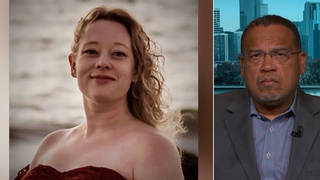
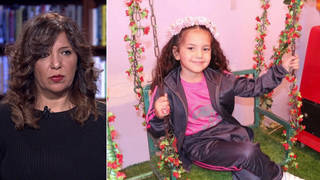
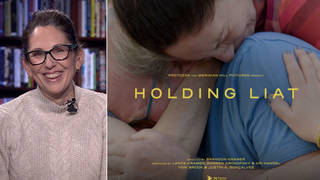

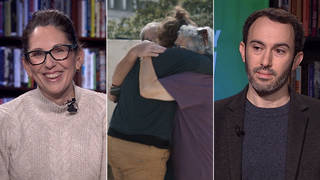
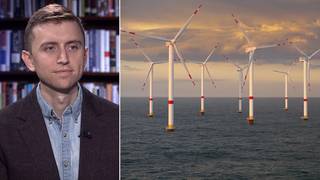

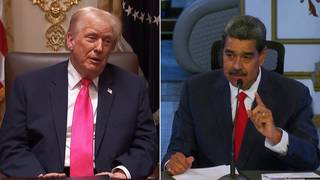



Media Options